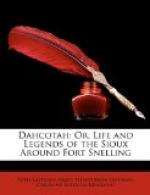* * * * *
Dimly, as the lengthened shadows of evening fall around them, are seen the outstretched arms of the suffering Dahcotah women, as they appeal to us for assistance—and not to proud man!
He, in the halls of legislation, decides when the lands of the red man are needed—one party makes a bargain which the other is forced to accept.
But in a woman’s heart God has placed sympathies to which the sorrows of the Dahcotah women appeal. Listen! for they tell you they would fain know of a balm for the many griefs they endure; they would be taught to avoid the many sins they commit; and, oh! how gladly would many of them have their young children accustomed to shudder at the sight of a fellow creature’s blood. Like us, they pour out the best affections of early youth on a beloved object. Like us, they have clasped their children to their hearts in devoted love. Like us, too, they have wept as they laid them in the quiet earth.
But they must fiercely grapple with trials which we have never conceived. Winter after winter passes, and they perish from disease, and murder, and famine.
There is a way to relieve them—would you know it? Assist the missionaries who are giving their lives to them and God. Send them money, that they may clothe the feeble infant, and feed its starving mother.
Send them money, that they may supply the wants of those who are sent to school, and thus encourage others to attend.
As the day of these forgotten ones is passing away, so is ours. They were born to suffer, we to relieve. Let their deathless souls be taught the way of life, that they and we, after the harsh discords of earth shall have ceased, may listen together to the “harmonies of Heaven.”
HAOKAH OZAPE;
THE DANCE TO THE GIANT
CHAPTER I.
The dance to the Giant is now rarely celebrated among the Dahcotahs. So severe is the sacrifice to this deity, that there are few who have courage to attempt it; and yet Haokah is universally reverenced and feared among the Sioux.
They believe in the existence of many Giants, but Haokah is one of the principal. He is styled the anti-natural god. In summer he feels cold, in winter he suffers from the heat; hot water is cold to him, and the contrary.
The Dahcotah warrior, however brave he may be, believes that when he dreams of Haokah, calamity is impending and can only be avoided by some sort of sacrifice to this god.
The incident on which this story is founded, occurred while I resided among the Sioux. I allude to the desertion of Wenona by her lover. It serves to show the blind and ignorant devotion of the Dahcotah to his religion.
And as man is ever alike in every country, and under every circumstance of life—as he often from selfish motives tramples upon the heart that trusts him—so does woman utterly condemn a sister, feeling no sympathy for her sorrow, but only hatred of her fault.




